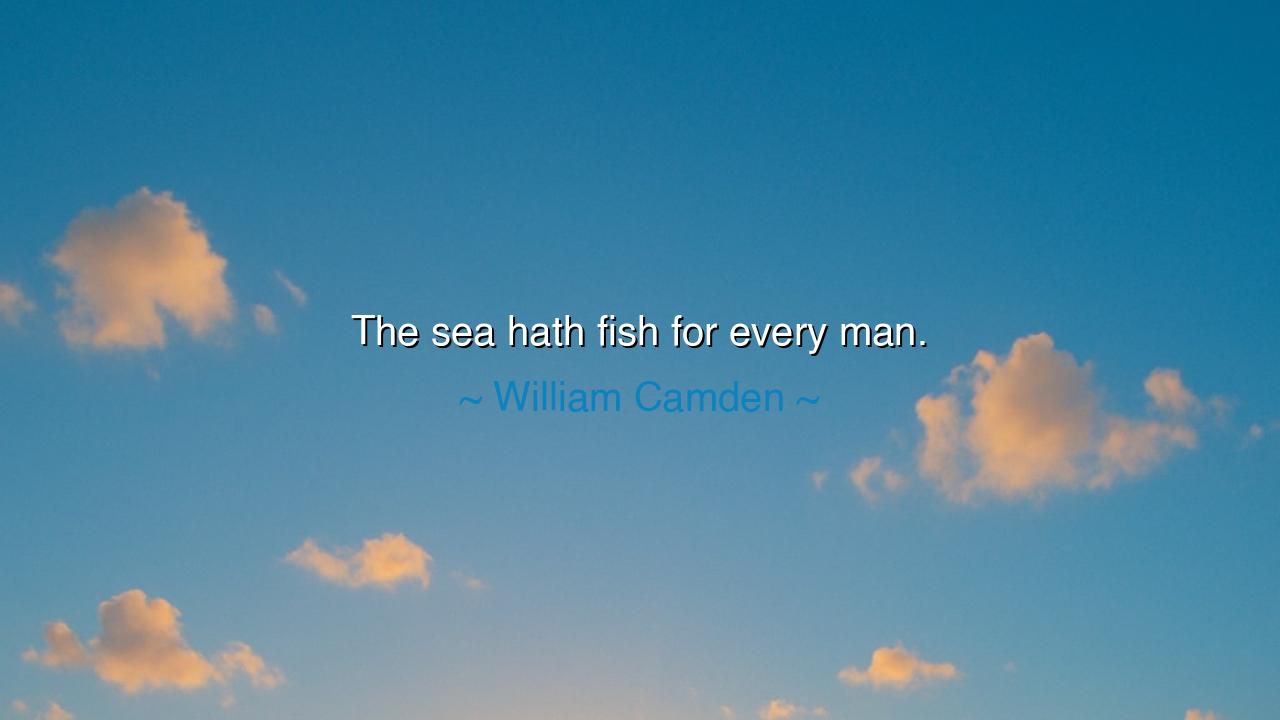
The sea hath fish for every man.






When William Camden wrote, “The sea hath fish for every man,” he spoke in the language of his age, but his words echo with the timeless rhythm of hope and abundance. Beneath their simplicity lies a truth as deep as the ocean itself: that life, vast and mysterious, holds opportunity for all who seek it. Camden, a scholar and historian of the Elizabethan era, lived in a time when sailors braved uncharted waters and the world seemed to expand with every tide. To him, the sea was more than water — it was the boundless realm of possibility, a symbol of fortune and destiny. And his saying, like a gentle wave, reminds us that there is enough in the world for those who dare to cast their nets.
To the wise, the sea has ever been a mirror of life — its calm and its storm, its peril and its promise. In Camden’s words, the ocean becomes a teacher, whispering that one man’s catch need not rob another’s. The fish within it are not finite rewards, but symbols of opportunity and calling. Each man may find his own sustenance, his own treasure, if only he is willing to venture forth. The saying carries the quiet assurance that the world is rich beyond measure — that there is work, love, and success enough for all who have the patience to seek and the courage to believe.
In the days of Camden, England’s mariners were setting sail into the unknown, guided only by stars and courage. The seas were dangerous, yet they offered freedom and fortune to those bold enough to leave the shore. It was a time when new lands were found, new trades opened, and the spirit of exploration transformed nations. Camden, observing this age of discovery, saw in it a parable of the human soul: that life, like the sea, rewards those who trust the voyage. To remain ashore in fear is to hunger forever; to step upon the waters, even uncertainly, is to open oneself to abundance. Thus, his proverb becomes not merely comfort, but command — an urging to act, to seek, to believe in the plenitude of creation.
There is, within his saying, also a deeper moral harmony. “The sea hath fish for every man” speaks against envy and despair. Too often, men look upon the success of others as if it diminishes their own. They forget that the sea is wide and its depths unfathomed. Camden’s wisdom reminds us that one man’s fortune is not another’s loss. The world, like the ocean, renews itself endlessly; it is not a battlefield of scarcity but a field of plenty. To envy is to waste time staring at another’s catch while your own net lies empty. To have faith, however — to trust that there is a portion meant for you — is to live in peace and purpose.
History, too, bears witness to this truth. Consider Christopher Columbus, who sought a western path to the East. Many mocked him; many said the world had already been divided, that there was nothing left to find. Yet he cast his ships into the unknown sea, believing that somewhere beyond the horizon, his fish awaited. And though he found not what he expected, his courage changed the world. So it is with all who trust in life’s abundance: their ventures may not lead them where they intended, but they always lead to discovery. The sea gives to those who have the will to sail.
Camden’s proverb is thus not a promise of ease, but of possibility. The sea may have fish for every man, but it does not place them in his hands. One must rise before dawn, mend one’s net, endure the salt and the storm. The fisherman who waits upon the shore, fearing waves or envying others, will never taste the sea’s bounty. The lesson, then, is not that the world gives freely, but that it gives justly — to those who work, who persevere, who trust the rhythm of life’s tides. Faith and effort together are the oars that move us toward abundance.
Therefore, O listener, let this wisdom anchor in your heart: life is not barren, nor is fortune reserved for the few. The sea is wide, and its depths are full. Do not envy, do not despair; take your vessel, however small, and set forth. Cast your net where your heart leads you — in love, in labor, in creation — and know that the universe holds something meant for you. If the first catch fails, try again; if the storm rises, endure. The sea is generous to the steadfast, for it respects courage more than perfection.
And thus, as William Camden taught in the quiet grandeur of his words, let none say there is not enough. The sea hath fish for every man — and for the one who believes this, the horizon will always hold promise. Sail boldly, live hopefully, and know that your portion waits beyond the mist, ready for the hand that dares to reach.






AAdministratorAdministrator
Welcome, honored guests. Please leave a comment, we will respond soon